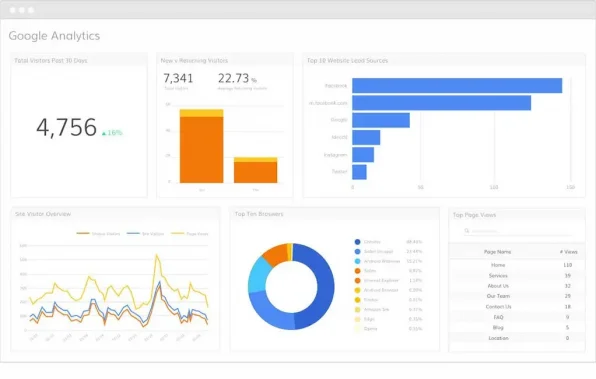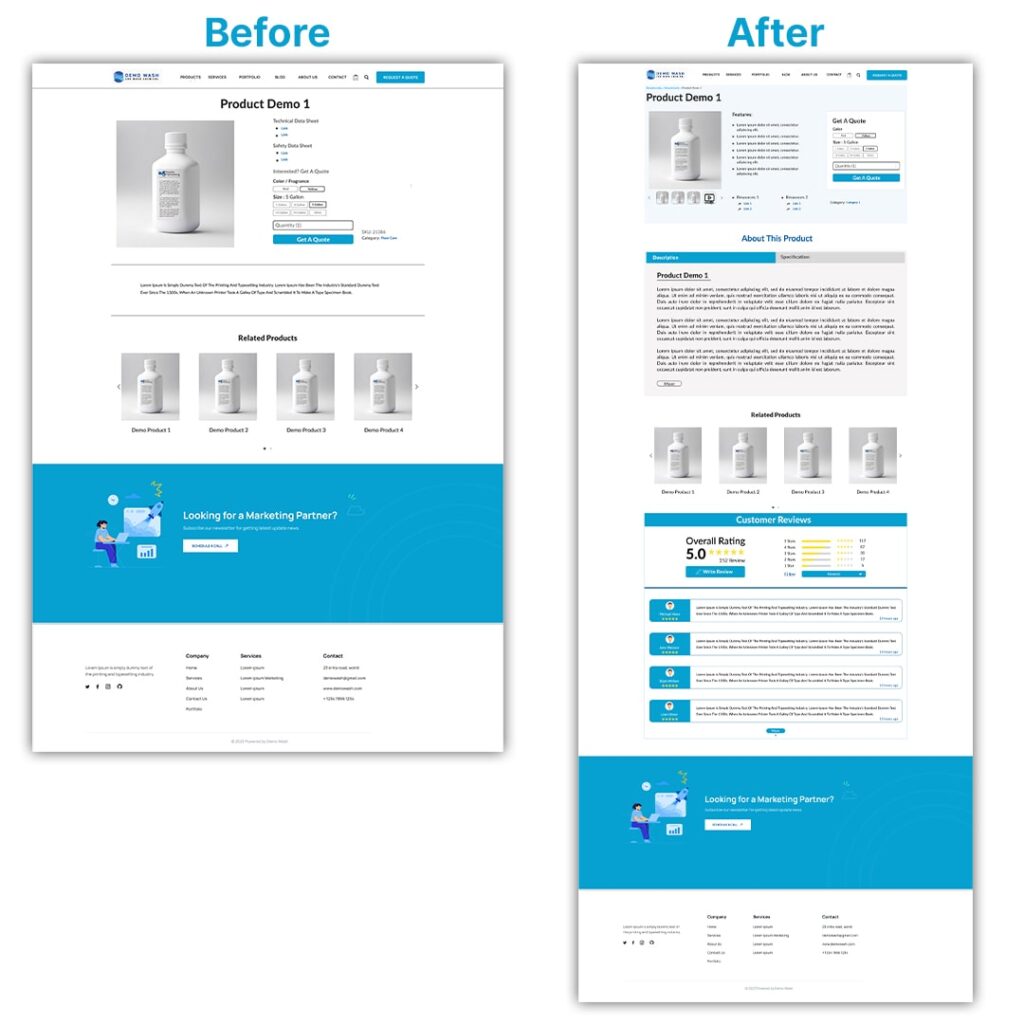“Alright, our new website is live,” the CEO exclaims, raising a toast with a freshly brewed cup of artisanal coffee. After all, the anticipation, the hard work finally paying off—it’s a moment worth celebrating. But what happens next?
Here’s the kicker: too often, amidst the cheers and high-fives, it’s easy to forget that launching a website is just the beginning of the journey. There are tons of things that must be taken care of!
Any ideas or guesses on what steps one should take to ensure their digital storefront stays polished and engaging? Or, to be more precise, how do you keep the momentum going in an era where every click counts?
Well, this is where website management for small businesses comes into the act!
From crafting compelling content to optimizing user experience, the list goes on.
Therefore, let’s shift gears and discover the secrets of effective website management tailored for small businesses. So, we don’t get behind the race!
What is Website Management for Small Businesses?
Website management for small businesses basically involves the regular upkeep and maintenance of a company’s website to make sure it stays relevant, functional, and appealing to visitors.
For example, if you run a small bakery, website management would include tasks like updating your menu with seasonal treats, fixing any broken links, and ensuring that your online ordering system works smoothly.
Essentially, it’s about keeping your digital storefront in tip-top shape to attract and retain customers.

Why Website Management for Small Businesses is Important?
Website management isn’t just about keeping the digital lights on—it’s about laying the foundation for your small business to thrive and flourish in the digital age.
With a well-managed website by your side, the sky’s the limit for your business’s success!
Didn’t understand? Here’s why keeping the website in top shape is a big deal for small businesses:
First Impressions Matter
Just like you wouldn’t want people walking into a dusty, messy store, you don’t want them stumbling onto a clunky, outdated website.
Website management keeps things fresh and appealing, ensuring visitors stick around long enough to become loyal customers. After all, you want to hook them in from the get-go, right?
Winning Trust and Street Cred
A well-kept website isn’t just pretty to look at—it screams reliability and credibility.
And let’s face it, customers are more likely to whip out their wallets for a business they trust. Keeping your site fresh and updated is like giving your credibility a little boost, which can translate to more sales and happier customers.
Rolling Out the Red Carpet for Visitors
Does anybody like a clunky, outdated website?
Certainly not, right?
However, you don’t have to worry about it anymore. As regular maintenance and updates ensure your site is a pleasure to navigate, keeping visitors happily clicking away instead of bouncing off to your competitors.
At the end of the day, it’s all about giving them the smoothest, most delightful online experience possible.

Security Sahield
With cyber threats lurking around every virtual corner, keeping your website secure is paramount. Because let’s be real, nobody wants to do business with a sketchy website.
Website management acts as your digital bodyguard, constantly monitoring for any suspicious activity and patching up any vulnerabilities before they can cause trouble.
Content Control
Your website is your platform to show what makes your business shine.
Whether it’s dazzling product photos, compelling blog posts, or glowing customer testimonials, website management gives you the reins to control and update your content whenever inspiration strikes.
Data Wizardry
Knowledge is power, especially when it comes to understanding your customers. Website management tools provide invaluable insights into who’s visiting your site, what they are clicking on, and how they are engaging with your content. As a result, based on this knowledge, you can tailor your offerings to better meet their needs and desires.
How to Manage a Small Business Website?
Managing a small business website is like tending to a garden – it needs regular care and attention to flourish. Here’s how to keep your digital storefront running smoothly:
Keep It Fresh
Just like a loaf of bread, your website can get stale if you don’t update it regularly.
What to do?
Whether it’s blog posts, product updates, or customer testimonials – regularly update your website with fresh content. This, in return, will show visitors that you are super active and engaged.
User Experience Matters
We all want visitors to find their way easily without getting lost in a maze of confusing menus, right? Otherwise, they will make their way somewhere else.
The same goes for your website.
Keep it simple, intuitive, and mobile-friendly. After all, no one likes squinting at their phone screen just to find your contact info!

Optimize for Search Engines (SEO)
The mystical world of SEO!
Don’t worry, it’s not as complex as it sounds. Just sprinkle some magical keywords throughout your website (without overdoing it!) and watch your rankings climb on Google.
How to do it?
Use relevant keywords, optimize your meta tags, and aim for quality backlinks. Much like planting seeds in a garden – the more you nurture, the more you will grow!
Speed Matters
Suppose, you are trying to order your favorite pizza online, but the website takes ages to load. Frustrating, right?
Don’t let your website suffer the same fate. Optimize its speed by compressing images, minifying code, and using a reliable hosting provider. Your visitors will thank you!
Security First
Just like locking your doors at night, you have got to keep your website safe from digital intruders. Invest in security measures like SSL certificates, strong passwords and regular backups to protect both your business and your customers’ data.
Engage With Your Audience
Don’t be the shy kid at the back of the class – interact with your visitors as much as possible.
Encourage them to leave comments, reviews, or even share their own experiences. Social media integration is also your best friend here. Get chatting, build relationships, and watch your community grow.
Analytics Are Your Friend
Numbers may not be as exciting as a circus clown riding a unicycle, but they are just as important. Use tools like Google Analytics to track who’s visiting your site, what they are clicking on, and how long they are sticking around.
This invaluable data can help you tailor your content and marketing strategies for desired outcomes.
3 Key Areas of Website Management to Know
When it comes to running a website, it’s not just about having a flashy design and some cool content thrown in.
Instead, there’s a whole world of behind-the-scenes action that needs attention to keep that digital ship sailing smoothly.
So, let’s hoist the sails and explore these top three key areas in all their glory:
Content Management
Suppose, you are wandering through a bustling library filled with books of all genres. Each book represents a page on your website, and you are the librarian making sure everything is organized, up-to-date, and easily accessible.
That’s essentially what content management is all about – ensuring that your website’s pages are well-maintained, with fresh and relevant content.
From updating blog posts to uploading new product descriptions, content management keeps your website engaging and informative for your visitors.

Technical Management
Now, let’s talk about the behind-the-scenes magic that keeps your website running smoothly. Technical management is like the engine that powers your digital vehicle.
It involves all the technical aspects of website maintenance, from ensuring server stability to optimizing loading times. You want your website to run smoothly, load quickly, and stay secure from any digital hiccups or threats.
Technical management ensures that your website not only looks great but also performs flawlessly. After all, nobody likes a slow or glitchy website, right?
Analytics and Optimization
Let’s switch gears and become detectives for a moment. For instance, you have a magnifying glass, and with it, you can find out invaluable insights about your website visitors – who they are, what they like, and how they navigate through your site.
That’s the magic of analytics and optimization!
And by digging into data from tools like Google Analytics, you can understand your audience better, track their behavior, and tweak your website to enhance their experience.
Be it optimizing for better search engine rankings or improving conversion rates, analytics, and optimization help you fine-tune your website for maximum impact.
7 Best Website Management Tools for Small Businesses
Whether you are a tech-savvy entrepreneur or a digital newbie, you have a handful of website management tools to make your life easier.
In fact, with just a few clicks (and maybe a sprinkle of creativity), you will be well on your way to digital success. They are as follows:
1. WordPress
First up, we have the ever-popular and classic WordPress. It’s like the Swiss Army knife of website platforms. Whether you are a blogging expert or an e-commerce entrepreneur, WordPress has got your back.
With its vast array of themes and plugins, you can customize your site to fit your brand like a glove. Plus, it’s pretty user-friendly, so you don’t need to be a coding specialist to make magic happen.
2. Wix
Next in line is Wix. It’s perfect for those who crave simplicity without sacrificing style.
Drag-and-drop functionality? Check. Stunning templates? Double check.
With Wix, you can whip up a professional-looking website in no time, even if the design isn’t exactly your forte. In other words, it’s super user-friendly and offers a plethora of templates, making it a dream for small businesses just starting out.
3. Squarespace
If sleek and modern is your vibe, Squarespace is your ultimate ticket to website stardom.
In other words, it’s the go-to for creatives and entrepreneurs who want a polished online presence without breaking a sweat. From elegant portfolios to stylish storefronts, Squarespace has everything you need to make a bold statement online.

4. Google Analytics
Now, let’s talk numbers – Google Analytics.
This powerhouse tool is like having a personal detective for your website.
Want to know who’s visiting your site, where they are coming from, and what they are doing while they are there?
Google Analytics has all the answers. With all this data, you can easily fine-tune your website to better cater to your audience’s needs and preferences.
5. Hootsuite
Social media is the lifeblood of many small businesses, but managing multiple platforms can feel like herding cats. That’s where Hootsuite swoops in to save the day!
It’s a social media management tool that lets you schedule posts, track engagement, and stay on top of trends—all from one convenient dashboard.
6. Mailchimp
Want to keep your customers in the loop without bombarding their inboxes?
Here’s Mailchimp – your friendly neighborhood email marketing platform. With its intuitive interface and robust features, you can create eye-catching campaigns, segment your audience, and track performance metrics with complete ease.
7. Yoast SEO
Last but certainly not least, we have Yoast SEO. This handy plugin helps you optimize your content for search engines, so you can climb those coveted search rankings in the most effective way possible.
From keyword optimization to readability checks, Yoast has all the tools you need to conquer the SEO game like a pro.
Top 5 Tips for Effective Website Management
Managing a website is like tending to a digital garden – it requires care, attention, and a sprinkle of creativity to flourish. So, let’s dig into some helpful tips for effective website management that will make your online presence bloom:
Stay Organized
Ever wandered through a maze-like garden? It’s confusing and frustrating.
Hence, don’t let your website become a labyrinth. Instead, keep things tidy with clear navigation and well-structured pages. In simpler terms, make it super easy and convenient for visitors to find what they are looking for.
Mobile-friendly is a Must
With more people browsing the web on their smartphones than ever before, it’s essential to ensure your website looks and performs flawlessly on mobile devices.
Hence, ensure your website looks and functions beautifully across all devices. Such as, you can keep responsive design principles to provide a smoother experience across all screen sizes.
Monitor Performance
Just like a gardener tends to their plants, you need to monitor your website’s performance regularly. Keep an eye on metrics like traffic, bounce rate, and conversion rates to identify areas for improvement. Tools like Google Analytics can be your best friend in this endeavor.
Regular Backups Are Non-negotiable
Murphy’s Law states that anything that can go wrong will go wrong – so be prepared!
Hence, always keep an eye out for broken links, outdated information, and security vulnerabilities. A healthy website is a happy website!

Continuous Improvement
Gardens evolve over time, and so should your website.
Therefore, listen to feedback, stay updated on industry trends, and always be open to trying new things. Continuous improvement is the secret to long-term success!
Wrapping Up
Congratulations!
Armed with newfound knowledge and strategies, you are well-equipped to steer your online presence toward success.
Remember, effective website management for small businesses is an ongoing journey of adaptation and refinement. Therefore, always stay curious, and creative, and above all, stay committed to delivering value to your audience.
FAQs
Keep your content fresh like a morning brew!
Aim for regular updates, whether it’s weekly blog posts or monthly product highlights. This not only keeps visitors coming back for more but also boosts your SEO rankings, showing search engines that your site is active and relevant.
Navigating limited resources and time constraints can be quite tough. Additionally, staying on top of security updates and technical maintenance while ensuring consistent content creation are some of the common challenges faced by small businesses on a regular basis.
Well, if you lack the time or expertise to manage your website effectively, hiring a professional service can be a game-changer. They will handle everything from regular updates and maintenance to optimizing your site for better performance, allowing you to focus on growing your business.
Consider using website builders like WordPress or Wix that offer user-friendly interfaces and affordable pricing plans. Plus, utilizing free or low-cost tools for tasks like analytics, SEO, and social media management can also help streamline your website management processes without breaking the bank.








